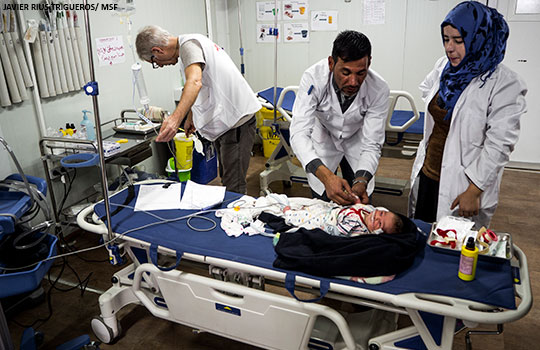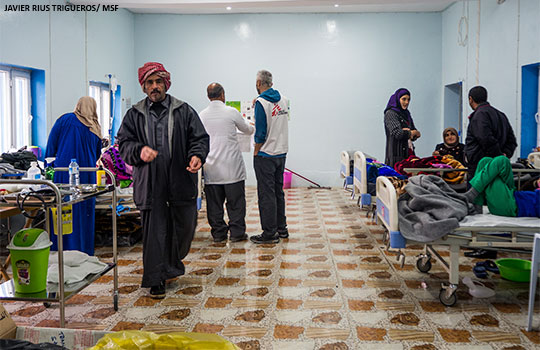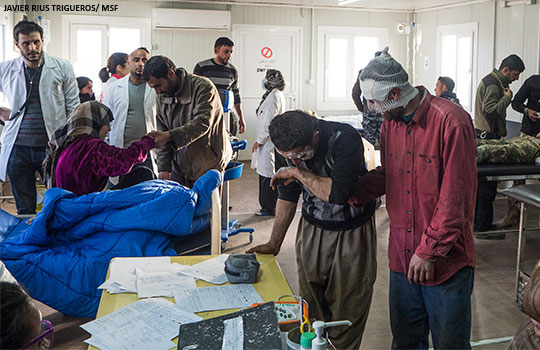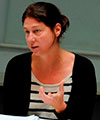In the battle to retake Mosul, MSF was forced to witness the expendability of human life

Ever since the battle for Mosul last year, questions about the decision of some medical aid groups to embed with the international coalition during the offensive have been raised, most recently in an article by Robert Fisk, published in the Independent last month, “Why are doctors in the Middle East cosying up to foreign armies?”
In it Fisk asks whether it was ethical for medical aid groups to fully embed in this context. He quotes one Médecins Sans Frontières (MSF) member, Jonathan Whittall, who argued that this close cooperation meant that care was not delivered on the basis of need alone, violating medical and humanitarian principles. Whittall also stated that the decision of for-profit organisations and military medical units to align themselves with one side of the conflict made it more difficult for MSF to establish itself as independent—putting our organisation at greater risk.
Certainly, the arrival of new aid groups on the frontlines did pose multiple questions for us; who were they, how did they operate, how did they triage their patients?
But the challenges we faced in Mosul were not created by the supposed threat that these groups represented to a “pure” and “principled” humanitarianism. They stemmed from the very real difficulties we faced in trying to assist Mosul’s survivors, and being unable to do anything for those civilians who were trapped and left to be condemned alongside IS.
The medical response had been organised by the Iraqi government, international donors, and the UN at the same time as they planned the military campaign. A whole chain for medical referral was established alongside the campaign, which included the wounded being evacuated from the frontlines by Iraqi forces, stabilised, and referred onwards to other medical facilities. Implementing partners were hired by the World Health Organization, including private health providers, who were ready to work very close to the frontlines and to be embedded with military personnel.

MSF was not one of those implementing partners. We chose not to locate a medical facility close to the combat zone because it was simply too dangerous. Mines, drone attacks, explosions, airstrikes, snipers, possible chemical attacks—these were tangible threats putting the lives of tens of thousands of civilians and humanitarian workers at risk.
Our choice, at a time when there were no functioning hospitals in Mosul, was to independently provide a wide range of health services to displaced people and local residents in safer locations—away from the frontlines, but still close enough to ensure a timely response.
We did work as part of the referral system, receiving wounded patients who’d been referred by the network of trauma stabilisation points coordinated by the Iraqi government and the UN. Inpatient capacity was overstretched and postoperative care insufficient. Even with this significant presence of medical responders, many patients did not survive.

Despite the choice to remain formally independent of the UN response, we negotiated with the armed forces exercising actual control over the territory—as we do in every conflict situation. In Mosul, we were only able to do this with one side of the conflict, as our attempts to engage in dialogue with IS had long since faltered. It was only with the Iraqi armed forces and their allied militias therefore that we negotiated our access to area, and that we negotiated the security of our teams.
Some of our biggest challenges were in relation to the treatment of patient detainees we received in the hospital we opened in Qayarah, south of Mosul. Brought in by various Iraqi authorities from detention centres, many of these patients showed clear signs of ill treatment and some were in a very serious condition.
Our teams did not know on what grounds the patients had been arrested, the conditions in which they were being held, or the criteria on which they were sent to us. Nor did we know what happened to them once Iraqi authorities had returned them to the detention centres. The only assistance that MSF staff could provide to this group of detainees was medical care. But to be blind to the circumstances of your patient raises questions for any humanitarian doctor.
Other questions gripped us during the final phase of the offensive on the Old City of Mosul. IS members were squeezed into a small, confined part of the city, which was still inhabited by large numbers of civilians. Despite this, heavy bombing of the Old City was authorised. Patients treated in the aftermath had injuries ranging from shrapnel wounds, gunshots, and blast injuries to burns and broken bones caused by collapsing buildings. This planned sacrifice of thousands of trapped civilians was the result of the encirclement of Old Mosul.
MSF’s stance did not help us to reach those civilians trapped in Old Mosul. We were a passive bystander, witness to the expendability of human life in the battle to retake the city. Although we did not share the coalition’s objectives and we were not one of the UN’s partners, we became a de facto component of the offensive’s damage limitation plan by assisting those people who did manage to escape. That is the bitter taste of being humanitarian in Mosul’s war.

Isabelle Defourny, MSF director of operations, Paris.
Competing interests: None declared.

Christine Jamet, MSF director of operations, Geneva.
Competing interests: None declared.
